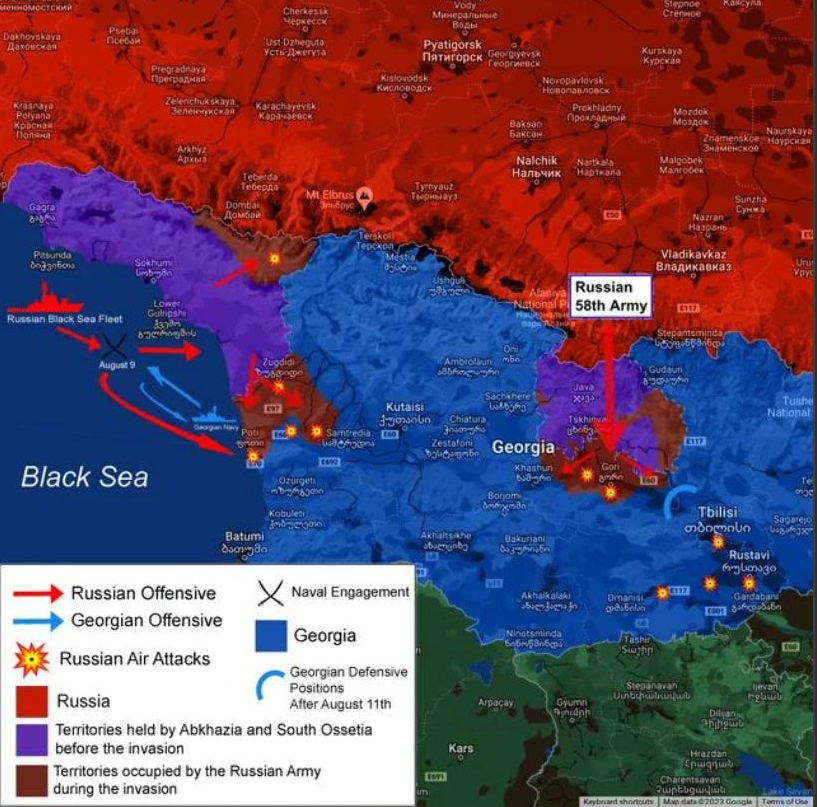Georgian Election Plunges Nation Into EU-Russian Deadlock
The Georgian elections plunged the Caucasus country into political uncertainty after the pro-Russian ruling party won amid allegations of Russian meddling.
Thousands of pro-European Union (EU) supporters have protested in the capital Tbilisi since the vote on October 26. The opposition has refused to recognize the results after a controversial partial recount confirmed that the ruling Georgian Dream party won.
Pro-European President Salome Zurabishvili declared the election results “illegitimate,” alleging there was a “Russian special operation” to undermine the vote. Prime Minister Irakli Kobachidze, who supports closer ties with Moscow, said that “any attempts to talk about election manipulation are doomed to failure.”
Similar to Moldova, where voting occurred last month, the Georgian election sparked a geopolitical battle between the West and Russia. The country’s Moscow-friendly authorities have pushed a pro-Russia agenda, while the opposition wants to improve ties with the West.
“The opposition presented the vote as a referendum on the country’s future: whether Georgia would be an EU democracy or an authoritarian country under Russia’s sway,” Alexander Atasuntsev, an independent journalist specializing in post-Soviet affairs, wrote for Carnegie Politika. “The ruling Georgian Dream party, on the other hand, portrayed it as a fateful choice between war and peace.”
The country’s election commission declared that Georgian Dream won its fourth consecutive term with 54% of the votes. The pro-European opposition parties won 37.8% of the vote.

EU, US Call For Georgian Election Investigation
Washington and Brussels have called for a full investigation into the Georgian elections. State Department spokesman Matthew Miller said that the US expects “further consequences if the Georgian government does not change course.”
The European Commission (EC) said a “divisive” atmosphere marked the election with “instances of bribery, double voting and physical violence.” Antonio-Lopez-Isturiz White, the head of the European Parliament’s delegation to the Organization for Security and Co-operation in Europe mission, accused Georgian Dream of promoting “Russian disinformation.”
In response, Moscow accused Western nations of trying to “destabilize” Georgia. “The naked eye can also see attempts to interfere, but not by Russia,” Russian presidential spokesman Dmitry Peskov said. “A huge number of forces from European countries tried to influence the outcome of this vote.”
Ahead of the elections, polls showed more than 80% of the country’s population in favor of European integration. In addition, the Russian invasion of Ukraine in 2022 has raised concern about Moscow’s intentions in Georgia, given its history of intervention.
Europe Wary Of Russian Intentions In Georgia
Moscow has considered Georgia a key part of its effort to reassert authority across the post-Soviet space. Russia currently endorses the pro-Russian de facto regimes in Abkhazia and South Ossetia after invading Georgia in 2008.

The breakaway regions of Abkhazia and the Republic of South Ossetia claimed independence from Georgia in the early 1990s, which Moscow recognized after its invasion. Russian troops have been deployed in central Abkhazia at the Black Sea and in Tskhinvali, the capital of South Ossetia.
Georgian authorities consider the Russian troop deployments illegal, occupying 20% of Georgian territory. Russia is also constructing a naval base in Ochamchire to strengthen its military presence in southern Abkhazia and the Black Sea.

Map Russian military offensive, 2008, source: Reddit
The US and the EU worry that Georgia may follow the path of Belarus, where Russia has based nuclear weapons.
“Critics of Georgia’s governing party fear the country may now follow the geopolitical trajectory of Belarus,” Nicholas Chkhaidze, a research fellow at the Baku-based Topchubashov Centerm, wrote for the Atlantic Council.
In recent years, it “has become increasingly subject to creeping Russian control in every sphere of national life from the economy to defense,” he wrote.
Georgia Moved Close To Moscow Under Ruling Party
The Georgian Dream party has grown increasingly close to Moscow despite European efforts to gain influence. The founder of Georgian Dream, Bidzina Ivanishvili, who has made his fortune in Russia, has warm ties with the Kremlin. Ivanishvili said he would ban opposition parties, holding them “fully accountable under the full force of the law.”
Georgian Dream has clashed with the EU before the election. The EU criticized a law labeling NGOs as foreign agents if they receive 20% or more of funding from abroad. The government has implemented laws that target the country’s LGBTQ+ communities, following a Russian blueprint.
After the Georgian elections, the ruling party snubbed members of the foreign relations committees from the parliaments of France, Germany, Poland, Sweden, Finland and the Baltic states. The opposition party met with the European delegation that traveled on Monday to Tbilisi for talks about the elections.
Kakha Kaladze, secretary general of Georgian Dream and mayor of Tbilisi, described the visiting EU politicians as “ordinary pests” and accused them of “propagating lies.”
Disclaimer:
Any opinions expressed in this article are not to be considered investment advice and are solely those of the authors. European Capital Insights is not responsible for any financial decisions made based on the contents of this article. Readers may use this article for information and educational purposes only.
This article is from an unpaid external contributor. It does not represent Benzinga’s reporting and has not been edited for content or accuracy.
© 2024 Benzinga.com. Benzinga does not provide investment advice. All rights reserved.

Leave a Reply